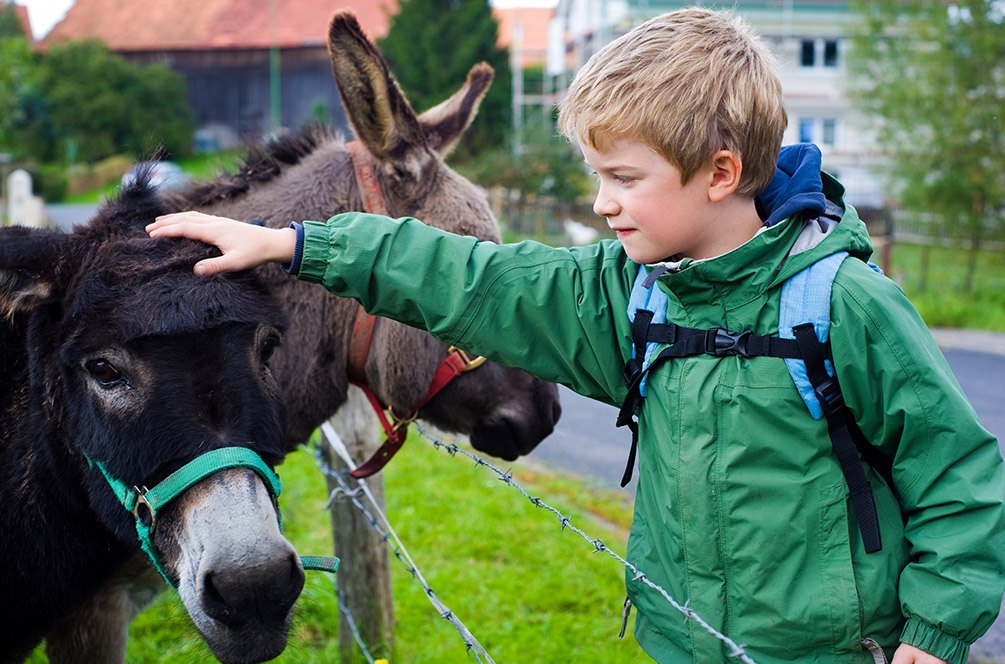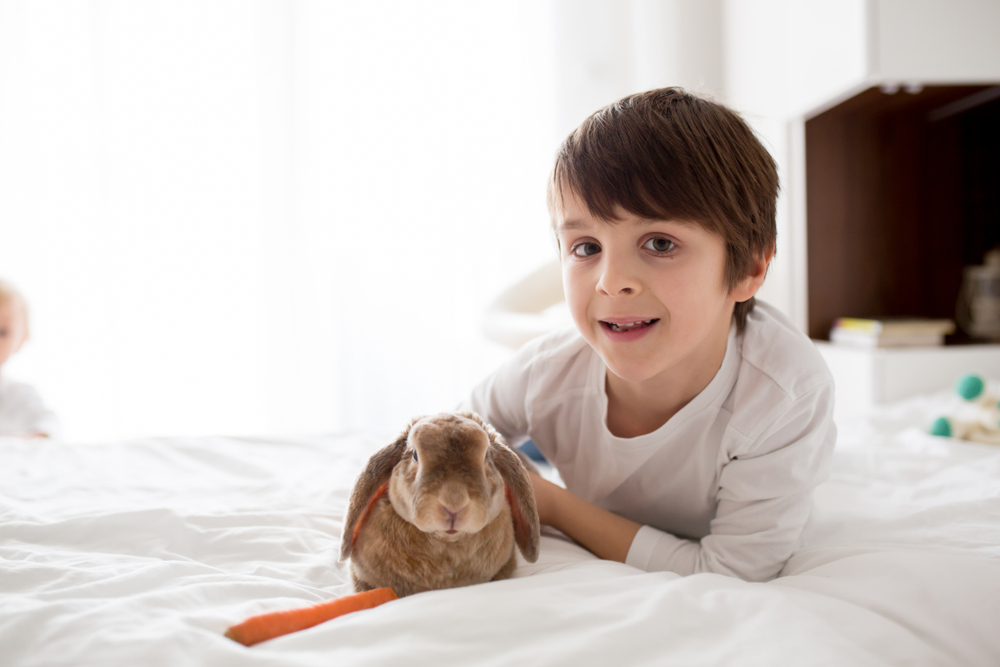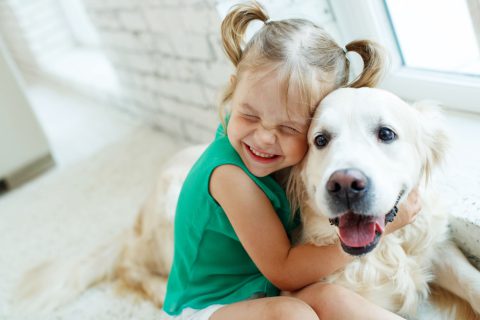Pets are lovable, cute and entertaining, but the benefits of having pets go much further. They can positively impact your child’s immune system, promote emotional well-being and be therapy for autistic children.
Benefits of having pets for children
Before introducing a pet to your family, you may wonder, do pets help child development?
Pets help child development in a variety of ways:
Responsibility and Empathy
- Pets are a commitment and require care to remain healthy and happy. By having a pet, children won’t only watch you take on this responsibility but will have the opportunity to be responsible themselves.
- You could give your child the option to name your new pet; this will begin their bonding process and assist those feelings of care towards their new friend. They can help you with pet care, such as cleaning the hamster’s cage and changing the cat litter. Not only will your child learn about caring for someone else, but being trusted with such tasks could improve their self-esteem and independence.
- The responsibility of having a pet can help teach children how to empathise with others. They may not feel like taking their dog for a walk, but they will learn to understand that their dog enjoys it and they want to make their dog happy. If they don’t feed their rabbit, the rabbit will be hungry, and children can understand what that would feel like to them. They are empathising with their pet by putting their pet’s needs above their own.
Social Skills
- The empathy pets spark in children can help them understand the feelings and thoughts of others without needing to be explicit; this can assist children in social situations by teaching them to respond appropriately to non-verbal cues.
- Your child may practice social skills by talking to their pet or observing how well their pet listens.
- Pets are excellent conversation starters and can be a distraction in new social situations. For example, if your adopted child invites a friend over to play, they can introduce them to their pet, putting both children at ease.
- Pets are especially beneficial for the social skills of children with autism if introduced at a young age, with studies suggesting that pets positively impact autistic children’s friendships. Children with ADD or ADHD can also reap the positive impacts of pets on their social skills.
Staying Active
- Whether chasing the dog up the garden or playing with the cat inside your home, pets will help keep your children active and improve their gross and fine motor skills.
- Fine motor skills involve using small muscles in the hands and wrists. Your child will use these muscles by opening and closing the rabbit hutch or using a teaser to play with the cat.
- Gross motor skills involve using the whole body and larger muscle groups. Walking or playing tug of war with the dog will help your child develop those gross motor skills.
Health
- Dogs can reduce the risk of asthma in children with a predisposition to the chronic illness. One study suggests that exposure to dogs in a child’s first year of life could reduce their risk of developing asthma by 13%.
- Another study found that children who lived in a home with a cat or dog suffered from fewer respiratory infections, colds and middle ear infections and also required fewer courses of antibiotics.
- Having a dog as a pet has also been linked to decreasing the likelihood of children developing eczema.
Mental Health Benefits of Pets

Adopted children may have an increased level of anxiety and stress when joining their new home. They are beginning a new journey and are learning their place in a new version of their world.
Can pets help with anxiety and stress? Yes, there are numerous therapeutic benefits of pets on children.
- Have you ever wondered why stroking a pet makes you feel so good? Stroking a pet releases dopamine, serotonin and oxytocin, hormones and neurotransmitters that contribute to improved happiness and mental well-being.
- Dopamine is associated with feelings of pleasure and reward, it impacts mood, sleep and learning.
- The unconditional love of a pet can help children stave off feelings of loneliness and increase self-esteem, and after a long day, it is comforting to know you can whisper your thoughts and feelings into a pet’s ear.
- The social skills and unconditional love that children gain from having a pet can promote positive attachments and contribute to long-lasting friendships. Meaningful friendships can enhance mental health; they offer mutual support and increase a sense of purpose.
- Dogs, in particular, are a fantastic excuse to get outside and breathe in that fresh air. Being in nature can improve mood as well as reduce stress and anxiety. Exercise also releases the same feel-good hormones produced when stroking a pet. Children will love playing fetch with their dog in a park or following their dog tracking a scent in the woods so much that it won’t feel like exercise!
- Animal-assisted therapy involves using an animal alongside a therapist to work through issues impacting mental health, such as anxiety, depression and trauma. Sessions could include stroking and cuddling a guinea pig, walking a dog or completing care tasks like grooming or feeding the animal. The therapist helps the child understand the feelings that present themselves during these interactions. It also gives the therapist an idea of how the child forms relationships and attachments, which is especially crucial for addressing trauma in adopted children.
ADHD, Autism and Pet Therapy
Children with ADHD and Autism benefit from pets in the same way as other children; however, service dogs can offer additional assistance.
Specialist-trained dogs can support children with autism and ADHD in a mixture of ways.
Autism and pet therapy -
- Service dogs can prevent autistic children from harming themselves by recognising behaviour that could injure the child and intervene with impactful motions, such as using their body to block a child from hitting their head against the floor.
- Service dogs can calm an autistic child during a meltdown by placing their paws on the child or fetching items that could soothe sensory overload, such as ear defenders.
- Deep pressure therapy involves the dog using their body weight to apply pressure to the child’s body, which can reduce anxiety or distress.
ADHD and pet therapy -
- Assistance dogs for children with ADHD can prevent the child from becoming distracted by redirecting them back to a task.
- They can assist ADHD children with their organisation by bringing them daily items, such as clothing and book bags, to build routine skills.
- If a child with ADHD walks off, specially trained dogs can locate them.
- Like children with autism, children with ADHD can also benefit from pressure therapy and dogs that prevent harmful behaviours.

Things to consider when adding a pet to your family unit
- Which type of pet is suitable for you and your children? Every adopted child is unique; they may have had a bad experience with past pets, so it’s crucial to consider your child’s specific needs. Age can also be a factor; younger children may benefit from having a smaller pet, such as a guinea pig or rabbit.
- How much time can you give your pet? Dogs require time for walks and training, whereas cats are more independent.
- What type of pet is your home suitable for? Dogs require a good-sized, secure garden. Hamsters or gerbils may be more suitable pets if you live in a flat as they don’t need an outside space.
- Can you afford the additional costs of a pet? All pets require vet trips, regular parasite treatments, appropriate bedding and pet hotels or sitters if you go on holiday and can’t take your pet. It may also be worth investing in pet insurance to avoid any hard decisions if a vet’s bill is more expensive than expected.
Pets add so much to adopted children’s lives; they help development, offer companionship and can service complex needs. Here is more information about adopting a child when you have pets or want to add a pet to your family. If you have any questions, then please get in touch.

